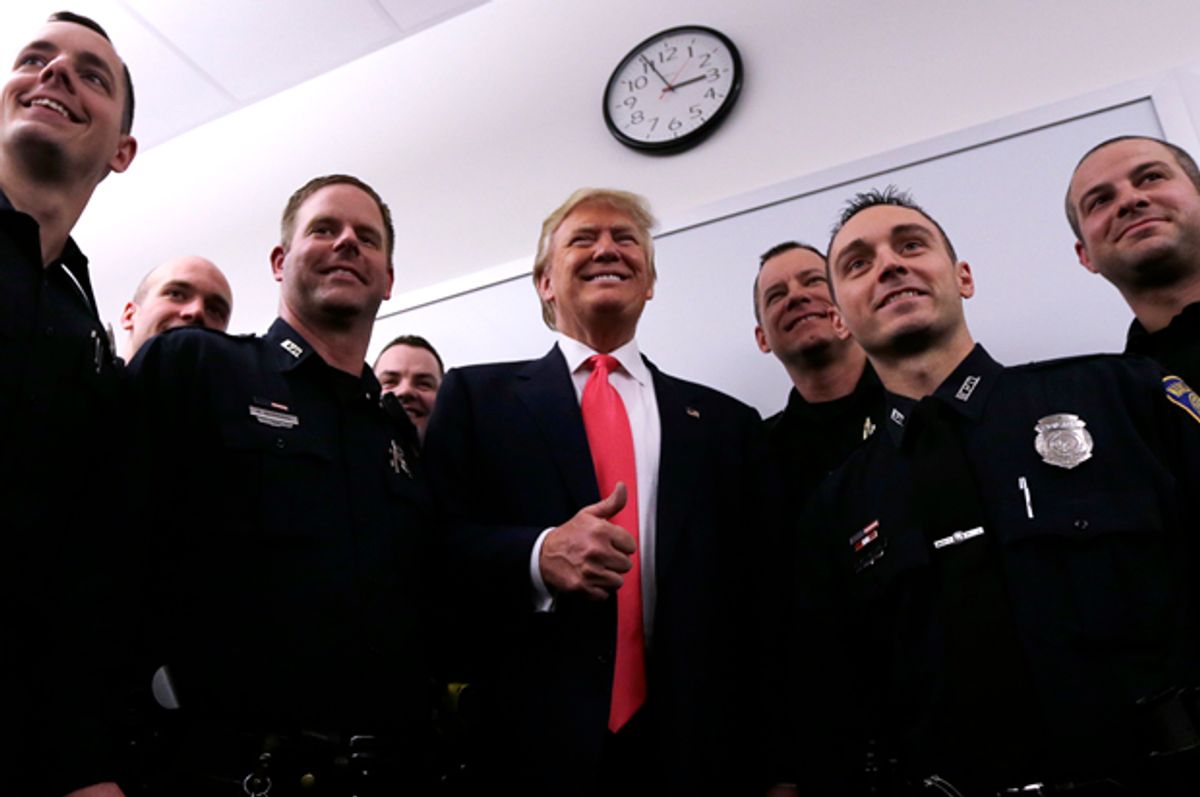On Thursday President Donald Trump signed three executive orders related to law enforcement. As with some of his past orders, this latest round seemed partly like a publicity stunt, designed more to make him look busy while having little practical effect in reality. Since he signed them during Jeff Sessions' swearing-in ceremony as the nation’s new attorney general, one could say they are the equivalent of giving a new employee his marching orders just before showing him to his desk on his first day of work.
On the surface, these orders would not seem to do much. One order directs Sessions to appoint someone to run the generically named Task Force on Crime Reduction and Public Safety. A second directs federal agencies to review ongoing efforts in pursuit of international drug cartels and criminal syndicates to make sure they are sufficiently effective and to report back to Trump in a few months on the results. The third order could be called the “Blue Lives Matter” executive order, and it mostly instructs Sessions to make extra, doubly sure that federal and local laws protecting against harm to law enforcement personnel are adequate and to recommend whether penalties for violence against authorities should be made harsher.
As a criminal justice researcher told Vox, “I’m simply not clear on what problem they solve.”
And therein lies the point. That statement could sum up Trump’s entire worldview on crime and criminal justice in America today. While rational people look outside and see a country where violent crime has been on the decline for two decades and the murder rate has dropped to its lowest levels in almost half a century, Trump sees a dystopian hellscape of ruined cities and rampaging drug cartels slaughtering citizens and cops with gleeful abandon. And when he translates this view into executive orders, he and the rest of the hard-right nationalists who share his dystopian views sound like dime-store novelists.
This, for example, is from his order on cracking down on drug cartels:
These organizations derive revenue through widespread illegal conduct, including acts of violence and abuse that exhibit a wanton disregard for human life. They, for example, have been known to commit brutal murders, rapes, and other barbaric acts.
This vision is one he has hammered over and over again both before and after the election. It's the vision he conjures when he speaks of “carnage” in urban centers and issues vague threats to the city of Chicago to clean up its act or he’ll clean it up himself.
And from this vision flows the language of a demagogue who needs to invent a problem so he and his new attorney general and his white-nationalist advisers — notably Steve Bannon and Stephen Miller — will have an excuse for coming down on it hard. They have made it abundantly clear, with their talk of destroyed inner cities in need of being saved and drug mules bringing heroin unimpeded across our wall-free southern border, just who in society will bear the brunt of this crackdown.
It is not the Trump voters in the largely white outer suburbs and rural areas, the people who voted him into office, who will have problems. It is the poorest and most vulnerable, the ones who come into contact with law enforcement every day, whose rights will be violated, even after the inevitable lawsuits start working their way through the courts. We already saw a precursor of how this will work with the Customs and Border Patrol officers who, unleashed by Trump’s executive order cracking down on immigration, managed to humiliate, terrify and deport thousands of (mostly) Muslim travelers and refugees before judges could step in.
At the other end of the racial and socioeconomic spectrum, the Trump administration has been busy rolling back every banking regulation put in place after the economic collapse of 2008. Thereby it is ensuring that the same people who swiped the nation’s wealth through a variety of risky financial instruments and unethical banking will be free to return to the same behavior, for which almost no one was ever punished.
This is to be the Trump administration, then: Using the power of the law to hurt the poorest and most vulnerable in America, under the guise of helping them by cleaning up problems the president and his people have exaggerated, at best, or simply made up — while the wealthiest, including Trump’s family, get a green light to lock up even more of the country’s wealth by any possible means. It is the "law and order" and thinly veiled racism of the Reagan or even the Nixon administrations, only without what, in retrospect, looks like their humanity.

Shares